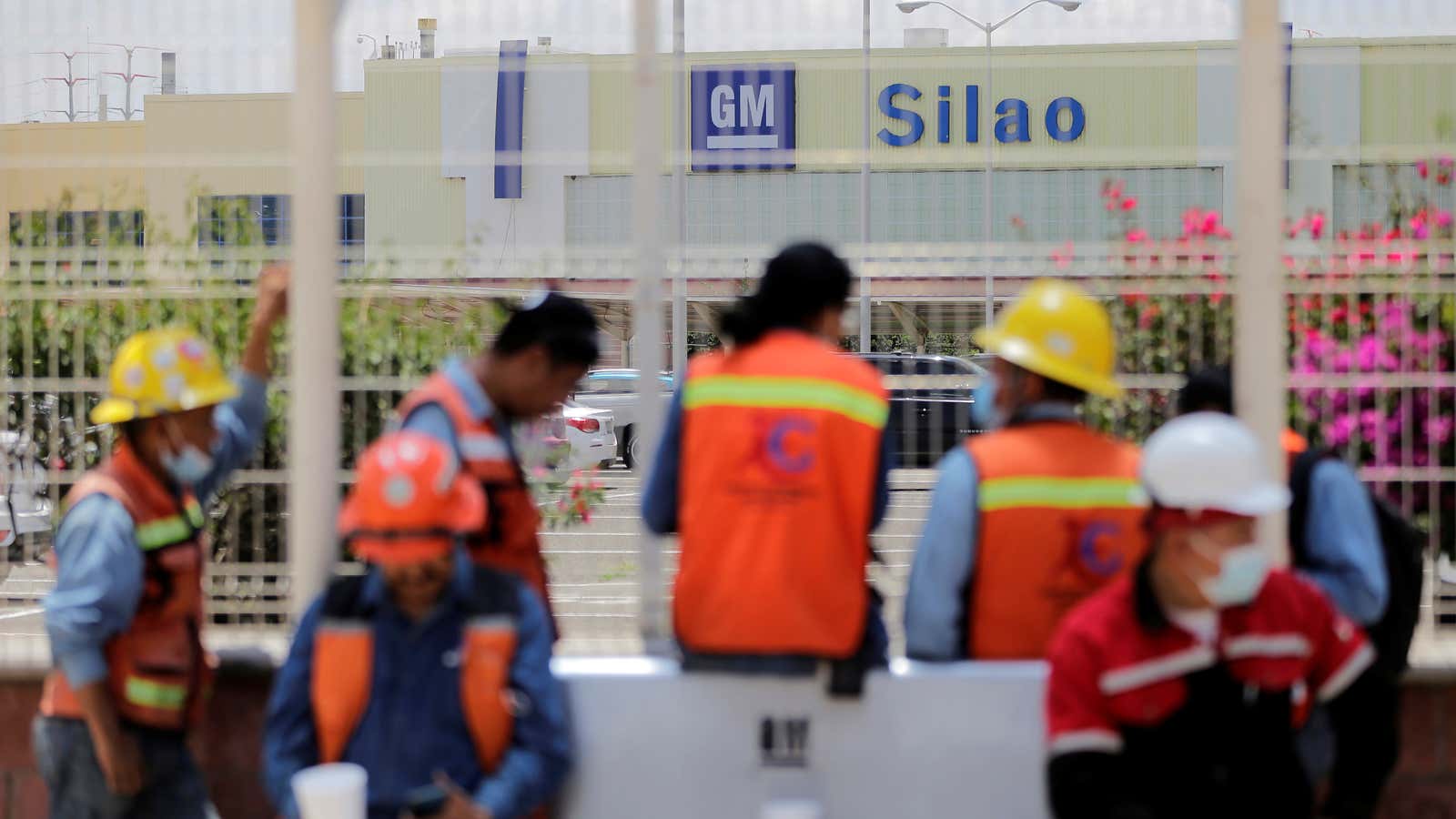Factory workers in Mexico are seeing early returns from the new international agreement that governs trade between the US, Mexico, and Canada.
Enacted in 2020 by president Donald Trump as part of his broad push against free trade, the deal included new tools for speedily enforcing labor rights laws, at the behest of Democrats and US labor unions. Now, under president Joe Biden, American trade negotiators have twice deployed the “rapid response mechanism” (RRM) in the US, Mexico, and Canada Agreement (USMCA) to force better treatment of workers in Mexican factories that export goods to the US.
Last week, a General Motors factory in Silao, Mexico, was forced to hold a do-over union election after the protection union was caught stuffing ballot boxes earlier this year. Workers rejected the old union contract, a first step towards obtaining real representation.
And on Aug. 10, the US Trade Representative struck a deal with a Mexican company called Tridonex, the subsidiary of US car parts producer Cardone, to hold new elections, and pay severance and backpay to at least 154 employees who were fired for their roles in labor organizing. It will also force the company to improve how it prevents Covid-19 and treats workers who suffer from coronavirus infections.
The USCMA is forcing employers to improve labor standards
Many labor unions in Mexico are seen as being in cahoots with employers, not representing workers. These “protection unions” fail to advocate for better wages or working conditions. As well as leaving Mexican workers worse off, they also exacerbate the movement of low-skill jobs out of the US.
Past trade deals have included requirements for member countries to improve labor laws, but their enforcement mechanisms typically resulted in multi-year slogs through intra-governmental negotiations with little actual change on the ground. In contrast, RRM allows the US government to target companies directly, even blocking the goods from specific facilities from coming over the border. That creates leverage for negotiators to win concessions on a speedier timeline.
“[Congress] wanted this to be much quicker, much more targeted [and] focused on individual facilities,” Josh Kagan, the acting US trade representative for labor issues, told Quartz. “We are two for two on that. The time frames here are quite different than we have elsewhere. We stuck to them. We’ve engaged with Mexico, with private companies, in both cases [with] meaningful results for workers.”
Kagan also said that neither case is finished; his office will be monitoring compliance with both settlements going forward.
Labor rights activists say democratic unions are needed
Still, the full potential of these agreements has yet to be seen. Mexican attorney Susana Prieto Terrazas has been working with an independent union to organize the Tridonex factory for several years. She welcomed the settlement, but said she was disappointed that workers representatives were not consulted when the US finalized its deal with Tridonex.
Under Cardone CEO Mike Carr, the factory refused match increases in the minimum wage until Prieto publicized old contracts, hidden from workers, that mandated such raises. The new settlement mandates that every worker receive a copy of their contract. Before the agreement, union organizers said that Tridonex fired hundreds of workers for labor activism; these are the workers who will receive new payments.
Despite this history, Cardone said in a statement that “it does not believe that a denial of workers’ rights has occurred at the facility.” Cardone is owned by Brookfield, a Canadian private equity firm that trumpets its adherence to labor standards on its website. Brookfield, which participated in negotiations with the US Trade Representative, did not respond to multiple requests for comment about the treatment of workers at Tridonex.
For Prieto, the most important concern is to see a representative union elected for the workers at the facility. It’s not yet clear when Mexican authorities will approve a new election, and US labor advocates have raised concerns that the Mexican government is slow-walking the implementation of the labor laws (pdf) it enacted in 2019 to meet the USMCA’s standards.
“This is where the RRM becomes very important…[by] sending a signal to organizations and groups in Mexico that these commitments are meaningful and not just because the ministry of labor is watching, also because we are watching,” Kagan said.
